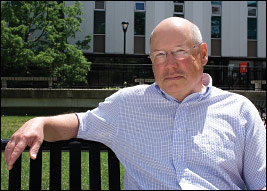Next: New concentrations in economics
Posted Jun. 19/07
From the global scale of the cost of climate change and the alleviation of poverty, to the personal level of how much interest we pay on our mortgage and how cell phone bundles are packaged and priced, economics is everywhere.

- An expert in the field of anti-competitive pricing, Professor Donald McFetridge brings real competition policy cases into the classroom to show students how they were argued and to examine whether rulings were consistent with the reasoning of economics.
As a way to understand how the world works, how people behave and how resources are allocated, economics provides the analytical framework to address the central issues that affect us every day. Naturally, the professors in Carleton’s Department of Economics are called on regularly by the private and public sectors to apply their discipline to a range of problems.
“The application of economic principles allows us to bring more than just an opinion to the table,” says Donald McFetridge, a professor of economics whose research interests include industrial organization, applied microeconomics and public policy issues. “Most economists do a lot of applied work.”
Economics provides a framework within which observations about individual and organizational behaviour can be collected, organized and analyzed. It is vital to the process of ensuring that the choices individuals make and the policies that corporations and governments adopt are sound.
For example, when the Canadian Manufacturers’ Association thought that tax incentives for research and development were insufficient, McFetridge’s work showed that Canada’s incentives were among the most generous in the world—and his measurement is still used.
In 2001, Nicholas Rowe, associate professor and associate dean in the Faculty of Public Affairs, created an economic model to help the Bank of Canada maintain its annual inflation-rate target at about two per cent. It earned him an appointment to the C.D. Howe Institute’s 12-person Monetary Policy Council, which offers the Bank of Canada advice on how to determine short-term, overnight interest rates, the most-important, recurring factor in controlling inflation.
McFetridge, a former holder of the T.D. MacDonald Chair in Industrial Economics at the Competition Bureau in Ottawa, praises the Competition Bureau and the Bank of Canada for their efforts to bring in academics to work on applied problems. “We have empirical and theoretical experience to contribute to practical problems. Often the discussion and knowledge advancement from one problem can be expanded to broader issues.”
Currently, McFetridge is looking at Canada’s productivity growth record for the Institute for Research on Public Policy to determine where things are going wrong: is Canada less innovative and slower to adopt technological change despite the government’s attempts to stimulate growth? Are the right problems being addressed?
He is also a member of the Market Surveillance Panel of the Ontario Energy Board, which has been monitoring pricing behaviour in Ontario’s deregulated electricity market since 2002.
“As well as business fields like banking and financial markets, and international trade, economics examines important social problems such as health care, climate change, resource depletion, poverty and the tax system,” says McFetridge. “We’re getting students from different backgrounds who see economics as an aid to understanding real world issues.”